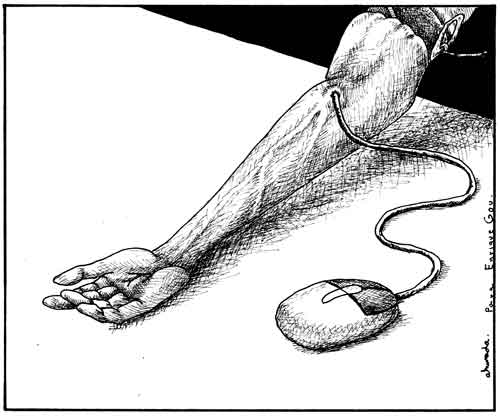Children addicted to the internet could soon be classed as having a serious mental illness, it has been claimed.

The diagnosis will include those who are addicted to their smartphones as well as using tablet computers or desktop machines.
Australian experts joined the Australian Psychological Society in submitting the classification to the international manual, and added an inclusion of internet gaming addiction.
From next May, the internet-use disorder will be listed as as a condition ‘recommended for further study’.
The addiction is said to be part of the fall-out over the ‘always on’ mentality that has engulfed many countries over the last decade, with the prevalence of cheap access and the rise of the smartphone.
Mike Kyrios from Swinburne University of Technology, who helped author the APS submission, told the Sun-Herald that, once more research is invested in the disorder, it will allow health professionals to diagnose children with addictive behaviours from technology over-use, leading to the correct treatment.
He said: ‘With kids, gaming is an obvious issue. But overall, technology use could be a potential problem.’
Another psychologist, Emil Hodzic, who runs a video game addiction treatment clinic in Sydney, said he was concernedcbecause of what he saw as growing demand from frustrated parents and damaged children.
He said he was seeing clients as young as 12 addicted to the internet and video games.
”The most typical sign of addiction is anything that looks like withdrawal symptoms,” he said.
‘So any expression of distress, frustration, irritability when they don’t get to play.”
He added that 70 per cent of his clients were children and teenagers and added: ‘a lot of kids I have coming into the clinic have difficulty in being able to tolerate distress without zoning out via the internet or via the games.’
Psychiatrist Rhoshel Lenroot gave a note of caution to the newspaper, saying: ‘I think [it] can be dangerous in not learning how to pay attention in a focused way, but in balance there is nothing wrong with technology.’
How ditching email can reduce your heart rate
Many of us struggle to go more than a few minutes without checking our email inboxes but new research suggests ignoring messages altogether can reduce stress by having a positive effect on the heart.
Scientists who attached heart rate monitors to office workers found they remained in a state of ‘high alert’ throughout the day if they had constant access to email.
Now University of California informatics professor Gloria Mark has given her verdict on email after running an experiment in which 13 volunteers ignored their ‘you’ve got mail’ chimes for five days.
She said:’We couldn’t see a discernible trend on days 1 and 2. But at day 5, the pattern started to become clear: People became less stressed after being away from email.
‘We used monitors that measured the heart rate and also the intervals between heartbeats to obtain a common measure for stress called heart rate variability.
‘People reported that they were more productive. They said they were able to focus on tasks longer. That was borne out by the data.
‘On average, people with email switched windows about 37 times per hour. Without email, that was cut in half to 18 times per hour.
‘With email, they spent an average of 394 seconds on any particular window. That went up to 568 seconds without email. This may not seem a lot, but in the world of multitasking it’s a huge difference.
People said they felt liberated, and the euphoria lasted for a few days. They really tried very hard to make a change. But then everybody reverted back to their old ways.
Culled from DailyMail.co.uk

